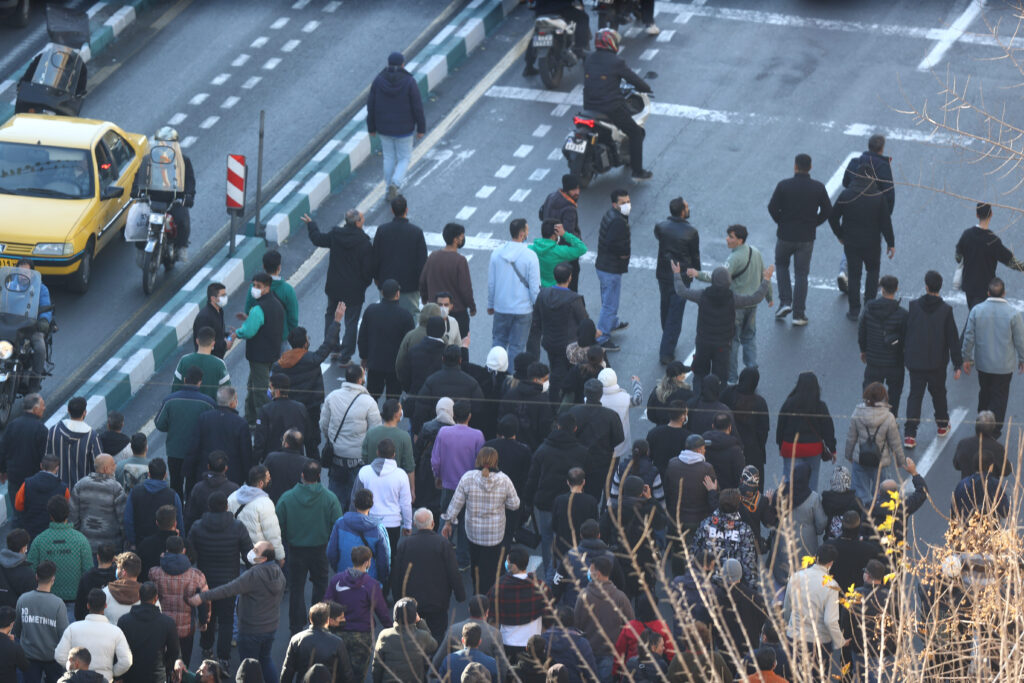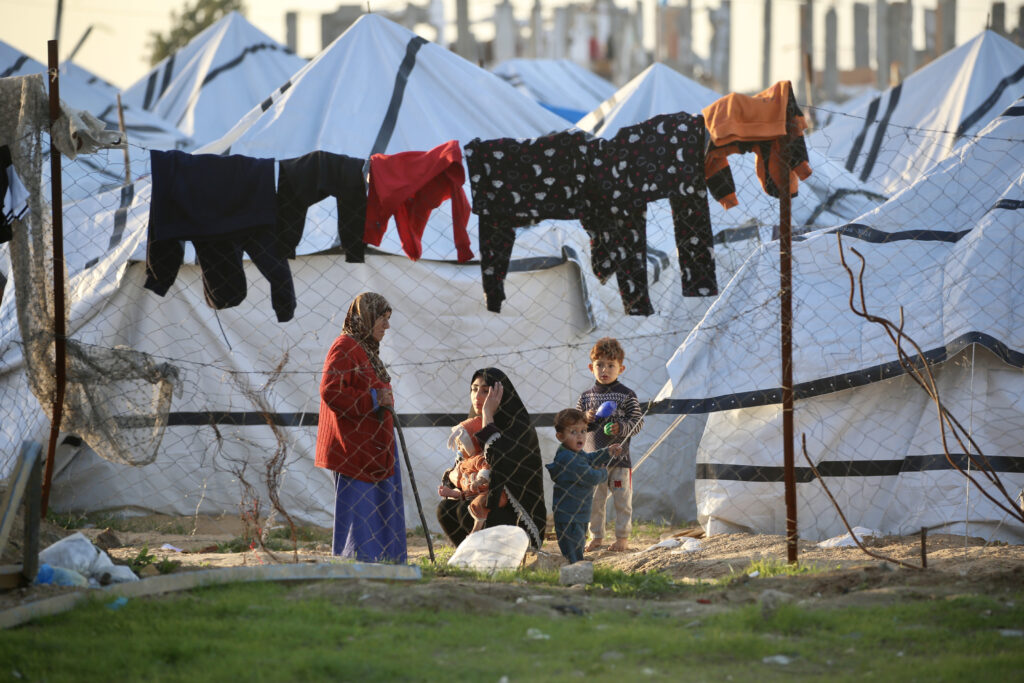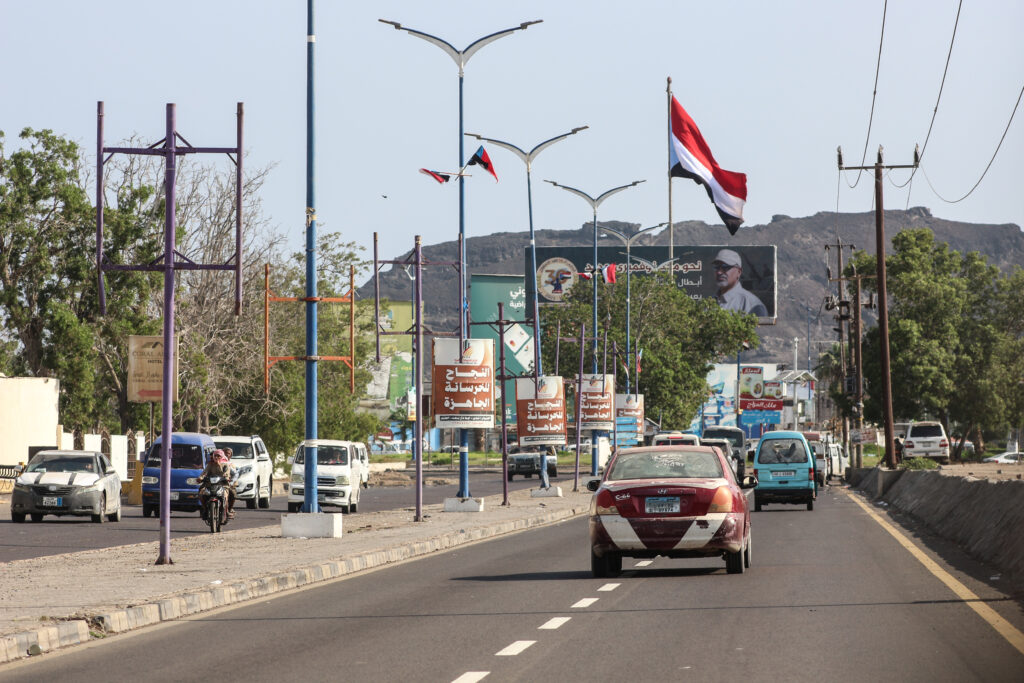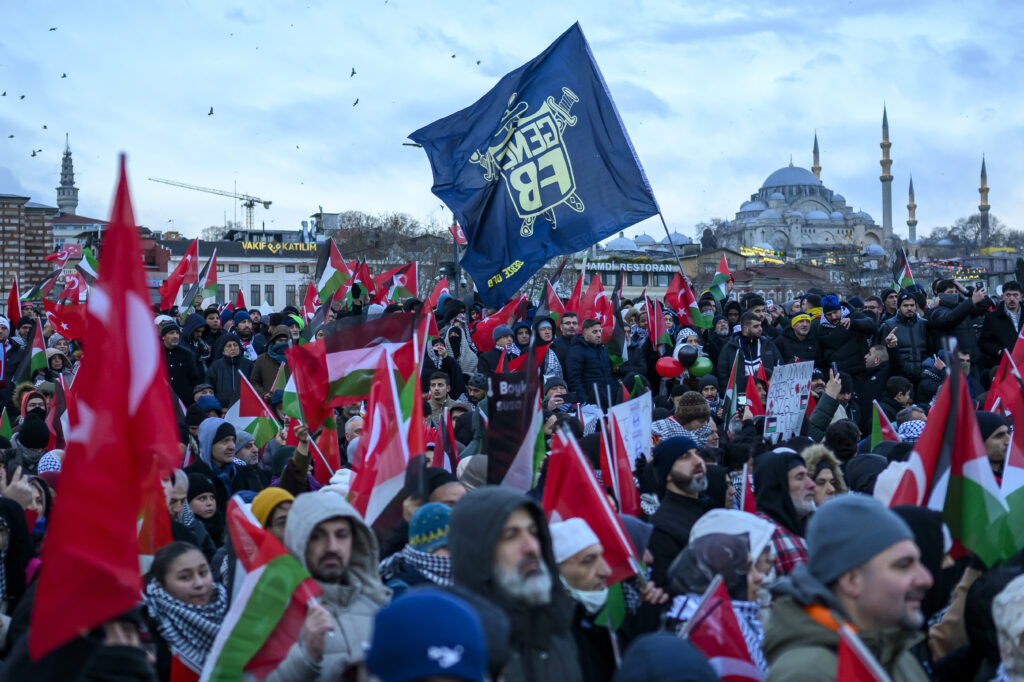AFP Asia Business
Fresh clashes kill six in Iran cost-of-living protests
Protesters and security forces clashed in several Iranian cities on Thursday, with six reported killed, the first deaths since the cost-of-living demonstrations broke out.The protests began on Sunday in Tehran, where shopkeepers went on strike over high prices and economic stagnation, and have since spread to other parts of the country.On Thursday, Iran’s Fars news agency reported two people killed in clashes between security forces and protesters in the city of Lordegan, in the province of Chaharmahal and Bakhtiari, and three in Azna, in neighbouring Lorestan province.”Some protesters began throwing stones at the city’s administrative buildings, including the provincial governor’s office, the mosque, the Martyrs’ Foundation, the town hall and banks,” Fars said of Lordegan, adding that police responded with tear gas.Fars reported that the buildings were “severely damaged” and that police arrested several people described as “ringleaders”. In Azna, Fars said “rioters took advantage of a protest gathering… to attack a police commissariat”.During previous protest movements, state media has labelled demonstrators “rioters”.Earlier Thursday, state television reported that a member of Iran’s security forces was killed overnight during protests in the western city of Kouhdasht.”A 21-year-old member of the Basij from the city of Kouhdasht was killed last night by rioters while defending public order,” the channel said, citing Said Pourali, the deputy governor of Lorestan Province.The Basij are a volunteer paramilitary force linked to Iran’s Revolutionary Guards, the ideological branch of the Islamic republic’s army.Pourali said that “during the demonstrations in Kouhdasht, 13 police officers and Basij members were injured by stone throwing”.In the western city of Hamedan, protesters torched a motorbike in what the Tasnim news agency described as an unsuccessful attempt to burn down a mosque.The same agency reported on Thursday that 30 people in a district of Tehran had been arrested the night before for alleged public order offences in a “coordinated operation by the security and intelligence services”.- ‘End up in hell’ -The demonstrations are smaller than the last major outbreak of unrest in 2022, triggered by the death in custody of Mahsa Amini, who was arrested for allegedly violating Iran’s strict dress code for women.Her death sparked a nationwide wave of anger that left several hundred people dead, including dozens of members of the security forces.The latest protests began in the capital and spread after students from at least 10 universities joined in on Tuesday.Iranian President Masoud Pezeshkian has sought to calm tensions, acknowledging protesters’ “legitimate demands”, and he urged the government Thursday to take action to improve the economic situation.”From an Islamic perspective… if we do not resolve the issue of people’s livelihoods, we will end up in Hell,” Pezeshkian said at an event broadcast on state television.Authorities, however, have also promised to take a “firm” stance, and have warned against exploiting the situation to sow chaos.Local media coverage of the demonstrations has varied, with some outlets focusing on economic difficulties, and others on incidents caused by “troublemakers”.Iran is in the middle of an extended weekend, with the authorities declaring Wednesday a bank holiday at the last minute, citing the need to save energy during the cold weather.They made no official link to the protests.The weekend in Iran begins on Thursday, and Saturday is a long-standing national holiday.Iran’s prosecutor general said on Wednesday that peaceful economic protests were legitimate, but any attempt to create insecurity would be met with a “decisive response”.”Any attempt to turn economic protests into a tool of insecurity, destruction of public property, or implementation of externally designed scenarios will inevitably be met with a legal, proportionate and decisive response.”- Viral video -Earlier this week, a video showing a person sitting in the middle of a Tehran street facing down motorcycle police went viral on social media, with some seeing it as a “Tiananmen moment” — a reference to the famous image of a Chinese protester defying a column of tanks during 1989 anti-government protests in Beijing. On Thursday, state television alleged the footage had been staged to “create a symbol” and aired another video purportedly shot from another angle by a police officer’s camera. Sitting cross-legged, the protester remains impassive, head bowed, before covering his head with his jacket as behind him a crowd flees clouds of tear gas.On Wednesday evening, Tasnim reported the arrest of seven people it described as being affiliated with “groups hostile to the Islamic Republic based in the United States and Europe”.It said they had been “tasked with turning the demonstrations into violence”. Tasnim did not say when they were arrested.The national currency, the rial, has lost more than a third of its value against the US dollar over the past year, while double-digit hyperinflation has been undermining Iranians’ purchasing power for years. The inflation rate in December was 52 percent year-on-year, according to the Statistical Centre of Iran, an official body.
Israel confirms ban on 37 NGOs in Gaza
Israel on Thursday said 37 humanitarian agencies supplying aid in Gaza had not met a deadline to meet “security and transparency standards”, and would be banned from the territory, despite an international outcry. The international NGOs, which had been ordered to disclose detailed information on their Palestinian staff, will now be required to cease operations by March 1.The United Nations has warned that this will exacerbate the humanitarian crisis in the war-ravaged Palestinian territory.”Organisations that have failed to meet required security and transparency standards will have their licenses suspended,” Israel’s Ministry of Diaspora Affairs and Combating Antisemitism said in a statement.Several NGOS have said the requirements contravene international humanitarian law or endanger their independence.Israel says the new regulation aims to prevent bodies it accuses of supporting terrorism from operating in the Palestinian territories.Prominent humanitarian organisations hit by the ban include Doctors Without Borders (MSF), the Norwegian Refugee Council (NRC), World Vision International and Oxfam, according to a ministry list.In MSF’s case, Israel accused it of having two employees who were members of Palestinian militant groups Islamic Jihad and Hamas. MSF said this week the request to share a list of its staff “may be in violation of Israel’s obligations under international humanitarian law” and said it “would never knowingly employ people engaging in military activity”.- ‘Critical requirement’ -NRC spokesperson Shaina Low told AFP its local staff are “exhausted” and international staff “bring them an extra layer of help and security. Their presence is a protection.”Submitting the names of local staff is “not negotiable”, she said. “We offered alternatives, they refused,” hse said, of the Israeli regulators.The ministry said Thursday: “The primary failure identified was the refusal to provide complete and verifiable information regarding their employees, a critical requirement designed to prevent the infiltration of terrorist operatives into humanitarian structures.”In March, Israel gave NGOs 10 months to comply with the new rules, which demand the “full disclosure of personnel, funding sources, and operational structures”.The deadline expired on Wednesday.The 37 NGOs “were formally notified that their licenses would be revoked as of January 1, 2026, and that they must complete the cessation of their activities by March 1, 2026,” the ministry said Thursday.A ministry spokesperson told AFP that following the revocation of their licences, aid groups could no longer bring assistance into Gaza from Thursday.However, they could have their licences reinstated if they submitted the required documents before March 1.Minister of Diaspora Affairs and Combating Antisemitism Amichai Chikli said “the message is clear: humanitarian assistance is welcome — the exploitation of humanitarian frameworks for terrorism is not”.- ‘Weaponisation of bureaucracy’ -On Thursday, 18 Israel-based left-wing NGOs denounced the decision to ban their international peers, saying “the new registration framework violates core humanitarian principles of independence and neutrality”.”This weaponisation of bureaucracy institutionalises barriers to aid and forces vital organisations to suspend operations,” they said.UN Palestinian refugee agency chief Philippe Lazzarini had said the move sets a “dangerous precedent”.”Failing to push back against attempts to control the work of aid organisations will further undermine the basic humanitarian principles of neutrality, independence, impartiality and humanity underpinning aid work across the world,” he said on X.On Tuesday, the foreign ministers of 10 countries, including France and Britain, urged Israel to “guarantee access” to aid in the Gaza Strip, where they said the humanitarian situation remains “catastrophic”. A fragile ceasefire has been in place since October, following a deadly war waged by Israel in response to Hamas’s unprecedented October 7, 2023 attack on Israel.Nearly 80 percent of buildings in Gaza have been destroyed or damaged by the war, according to UN data. About 1.5 million of Gaza’s more than two million residents have lost their homes, said Amjad Al-Shawa, director of the Palestinian NGO Network in Gaza.
Yemen separatists say Saudi-backed forces to deploy in seized territories
Separatists from Yemen’s Southern Transitional Council said on Thursday that Saudi-aligned government forces would enter territories seized by the UAE-backed group, in a step that appeared unlikely to satisfy Riyadh after it repeatedly demanded their full withdrawal.A surprise offensive by the STC, in which the separatists took control of resource-rich Hadramawt and Mahra provinces last month, has brought the United Arab Emirates and Saudi Arabia, officially allies in Yemen, to a point of unprecedented tension.On Tuesday, the Saudi-led coalition in Yemen struck what it said was a shipment of Emirati weapons in the port of Mukalla destined for the separatists, a claim Abu Dhabi has denied, and demanded that STC forces withdraw from the newly captured territory.In its statement on Thursday, the STC said it would continue to operate in the regions but had agreed to the deployment of the Riyadh-backed National Shield government force in the areas.”Today, we launched an operation to integrate the southern National Shield forces so that they can assume the responsibilities and missions that fall to our armed forces,” they announced.The statement said a National Shield brigade would be deployed in “areas of the Hadramawt and Mahra governorates, as agreed”.But a source close to the Saudi government told AFP on Thursday that Saudi Arabia’s security needs would only be met if the STC “move out of Hadramawt and Mahra”.The source, speaking on condition of anonymity to discuss the sensitive matter, said the redeployment of government forces did not go far enough.”We have to wait and see what is carried out on the ground,” they added.Another source close to the Saudi military told AFP the Riyadh-led coalition was closely following events on the ground and making its own assessment. The STC later dismissed criticism of the deal, saying that the government forces that would enter their areas would be predominantly made up of southerners who had been funded and supervised by Saudi Arabia. “Their deployment along the Saudi border nullifies any argument used by those lying in wait to incite Saudi Arabia,” STC spokesman Anwar Al Tamimi told AFP. – ‘Security demands’ -Farea Al-Muslimi, a Gulf and Yemen researcher at the UK-based Chatham House think tank, characterised the deployment as a “face-saving measure” on the part of the STC that had been offered to Riyadh and rejected in the past. “If a complete withdrawal and handover of Hadramawt and Mahra takes place, it could be a prelude to de-escalation,” he told AFP.”If it doesn’t happen… it will never resolve Saudi Arabia’s clear and direct security demands,” Muslimi added.Musaed Salem — a bus driver who lives in Qatn city in Hadramawt — told AFP he was relieved to hear of the latest decision by the STC to allow government forces into their territories, saying he hoped it brought greater stability and eased tensions. “We don’t want war. We want security and stability in Hadramawt and everywhere,” he said. Saudi Arabia, the main backer of the Yemeni government, had repeatedly urged the STC to withdraw from recently conquered territories, particularly areas along its southern border, and earlier conducted airstrikes against its positions.Following the strikes on Tuesday, the UAE’s defence ministry said it would withdraw its last remaining troops in Yemen after Saudi Arabia imposed a 24-hour deadline for their removal. The Yemeni government, of which the STC is a part, comprises a fractious coalition of groups united by their opposition to the Iranian-backed Houthi rebels who seized the capital Sanaa in 2014 and subsequently large parts of northern Yemen.While both are opposed to the Houthis, Riyadh and Abu Dhabi back different members of the Yemeni government.The STC’s December advance raised the possibility of that South Yemen, a separate state from 1967 to 1990, might declare independence, while dealing a hammer blow to slow-moving peace negotiations with the Iran-backed Houthi rebels.Emirati troops arrived in Yemen as part of the Saudi-led coalition fighting the Houthis, who had forced the government from the capital Sanaa in 2014 and seized much of the country.The UAE pulled out most of its forces in 2019, leaving only a limited number in the government-run south.
Thousands stage pro-Gaza rally in Istanbul
Thousands joined a New Year’s Day rally for Gaza in Istanbul Thursday, waving Palestinian and Turkish flags and calling for an end to the violence in the tiny war-torn territory. Demonstrators gathered in freezing temperatures under cloudless blue skies to march to the city’s Galata Bridge for a rally under the slogan: “We won’t remain silent, we won’t forget Palestine,” an AFP reporter at the scene said. More than 400 civil society organisations were present at the rally, one of whose organisers was Bilal Erdogan, the youngest son of Turkish President Recep Tayyip Erdogan.Police sources and Anadolou state news agency said some 500,000 people had joined the march at which there were speeches and a performance by Lebanese-born singer Maher Zain of his song “Free Palestine”. “We are praying that 2026 will bring goodness for our entire nation and for the oppressed Palestinians,” said Erdogan, who chairs the board of the Ilim Yayma Foundation, an educational charity that was one of the organisers of the march. Turkey has been one of the most vocal critics of the war in Gaza and helped broker a recent ceasefire that halted the deadly war waged by Israel in response to Hamas’s unprecedented attack on October 7, 2023. But the fragile October 10 ceasefire has not stopped the violence with more than more than 400 Palestinians killed since it took hold.
Israel says it ‘will enforce’ ban on 37 NGOs in Gaza
Israel said on Thursday that 37 international NGOs operating in Gaza had not complied with a deadline to meet “security and transparency standards,” in particular disclosing information on their Palestinian staff, and that it “will enforce” a ban on their activities.The groups will now be required to cease their operations by March 1, which the United Nations has warned will exacerbate the humanitarian crisis in the war-ravaged Palestinian territory.”Organisations that have failed to meet required security and transparency standards will have their licenses suspended,” the Ministry of Diaspora Affairs and Combating Antisemitism said in a statement on Thursday.Several NGOS have said the requirements contravene international humanitarian law or endanger their independence, while Israel has faced international criticism in the run-up to the deadline.Israel says the new regulation aims to prevent bodies it accuses of supporting terrorism from operating in the Palestinian territories.”The primary failure identified was the refusal to provide complete and verifiable information regarding their employees, a critical requirement designed to prevent the infiltration of terrorist operatives into humanitarian structures,” the ministry said.In March, Israel gave a ten-month deadline to NGOs to comply with the new rules, which demand the “full disclosure of personnel, funding sources, and operational structures.”The deadline expired on Wednesday.The 37 NGOs “were formally notified that their licenses would be revoked as of January 1, 2026, and that they must complete the cessation of their activities by March 1, 2026,” the ministry said Thursday.- ‘Weaponisation of bureaucracy’ -Minister of Diaspora Affairs and Combating Antisemitism Amichai Chikli said “the message is clear: humanitarian assistance is welcome — the exploitation of humanitarian frameworks for terrorism is not”.Numerous prominent humanitarian organisations have been hit by the ban, including Doctors Without Borders (MSF), World Vision International and Oxfam, according to the list provided by the ministry. In the case of MSF, Israel accused it of having two employees who were members of Palestinian militant groups Islamic Jihad and Hamas. MSF said earlier this week that the request to share a list of its staff “may be in violation of Israel’s obligations under international humanitarian law” and said it “would never knowingly employ people engaging in military activity”.On Thursday, 18 Israel-based left-wing NGOs denounced the decision to ban their international peers, saying “the new registration framework violates core humanitarian principles of independence and neutrality.””This weaponisation of bureaucracy institutionalises barriers to aid and forces vital organisations to suspend operations,” they said.On Wednesday, United Nations rights chief Volker Turk described Israel’s decision as “outrageous”, calling on states to urgently insist Israel shift course.”Such arbitrary suspensions make an already intolerable situation even worse for the people of Gaza,” he said.UN Palestinian refugee agency chief Philippe Lazzarini said the move sets a “dangerous precedent”.”Failing to push back against attempts to control the work of aid organisations will further undermine the basic humanitarian principles of neutrality, independence, impartiality and humanity underpinning aid work across the world,” he said on X.- ‘Catastrophic’ -On Tuesday, the foreign ministers of 10 countries, including France and the United Kingdom, urged Israel to “guarantee access” to aid in the Gaza Strip, where they said the humanitarian situation remains “catastrophic”. A fragile ceasefire has been in place in Gaza since October, following a deadly war waged by Israel in response to Hamas’s unprecedented attack on Israeli territory on October 7, 2023.Conditions for the civilian population in the Gaza Strip remain dire, with nearly 80 percent of buildings destroyed or damaged by the war, according to UN data. About 1.5 million of Gaza’s more than two million residents have lost their homes, said Amjad Al-Shawa, director of the Palestinian NGO Network in Gaza.
World welcomes 2026 with fireworks after year of Trump and turmoil
Revellers around the world toasted the start of 2026 on Thursday, bidding farewell to a volatile year when temperatures soared, US President Donald Trump upended global trade, and the brutal conflict in Ukraine raged on.While a fragile truce took hold in devastated Gaza, violence in Sudan continued unabated. A new American pope was installed at the Vatican, the world lost pioneering zoologist Jane Goodall, and Labubu dolls sparked a worldwide frenzy.In Sydney, partygoers paused for a minute of silence to remember the victims of the mass shooting on Bondi Beach before fireworks lit up the skies at the stroke of midnight.Heavily armed police patrolled the shoreline, packed with hundreds of thousands of people, barely two weeks after 15 people were gunned down at a Jewish festival in Australia’s deadliest mass shooting for almost 30 years.The famed Sydney Harbour Bridge was bathed in white light to symbolise peace.Pacific nations including Kiribati and New Zealand were the first to see in 2026, with Seoul and Tokyo following Sydney in celebrations that make their way around the globe with each passing hour.In Hong Kong, a major New Year fireworks display was cancelled in homage to 161 people killed in a fire in November that engulfed several apartment blocks.Ukrainian President Volodymyr Zelensky said his country was “10 percent” away from a deal to end the fighting with Russia, soon to reach the four-year mark.Russia’s Vladimir Putin meanwhile used his traditional New Year address to urge his compatriots to believe that Moscow would deliver a victory in Europe’s deadliest conflict since World War II.And Kim Jong Un praised North Korea’s “invincible alliance” with Russia, where Pyongyang has sent troops to assist Moscow.In the Ukrainian city of Vyshgorod, beauty salon manager Daria Lushchyk said the war had made her work “hell” but that her clients were still showing up.”Nothing can stop our Ukrainian girls from coming in and getting themselves glam,” Lushchyk said.- Tariffs and fragile truce -This year has brought a mix of stress and excitement for many, war for others still — and a daring jewel heist at the Louvre.Pop megastar Taylor Swift got engaged to her American football player boyfriend Travis Kelce, and K-pop heartthrobs BTS made their long-awaited return.Trump returned as US president in January, launching a tariff blitz that sent global trade and world stock markets into meltdown.The 79-year-old Republican met with Israel’s Prime Minister Benjamin Netanyahu for five meetings in his first year back in office — and hosted the ally at his lavish Florida resort, Mar-a-Lago, at a glittering New Year’s Eve party.After two years of war that left much of the Gaza Strip in ruins, pressure from Trump helped land a fragile ceasefire between Israel and Hamas in October — though both sides have accused each other of flagrant violations.”We bid farewell to 2025 with deep sorrow and grief,” said Gaza City resident Shireen Al-Kayali.”We lost a lot of people and our possessions. We lived a difficult and harsh life, displaced from one city to another, under bombardment and in terror.”In contrast, there was optimism despite abiding internal challenges in Syria, where residents of the capital Damascus celebrated a full year since the fall of Bashar al-Assad.”There is no fear, the people are happy, all of Syria is one and united, and God willing… it will be a good year for the people and the wise leadership,” marketing manager Sahar al-Said, 33, told AFP as bells rang in Damascus.In Dubai, thousands queued for up to nine hours for a spectacular fireworks and laser display at the Burj Khalifa, the world’s tallest building.Revellers popped champagne near the Eiffel Tower in Paris, Bulgaria adopted the euro, and huge crowds danced at Edinburgh’s Hogmanay street party.Crowds packed Rio de Janeiro’s Copacabana Beach for what authorities have called the world’s biggest New Year’s Eve party.”A wonderful, unforgettable day,” said partygoer Ayane de Fatima, 30, adding she hoped 2026 would be “free from the bad things happening in the world”.In the US capital, the Washington Monument was lit up as America kicked off its 250th birthday celebration year.And in New York, thousands gathered in freezing temperatures amid tight security for the traditional ball drop in Times Square.Nearby, at an abandoned subway stop near City Hall, Zohran Mamdani — a leftist and persistent thorn in Trump’s side — was sworn in as the city’s first Muslim mayor.- Sports, space and AI -The coming 12 months promise to be full of sports, space and questions over artificial intelligence.Athletes will gather in Italy in February for the Winter Olympics.And for a few weeks in June and July, 48 nations will compete in the biggest football World Cup in history in the United States, Mexico and Canada.NASA is planning a crewed mission to circle the moon during a 10-day flight, more than 50 years since the last Apollo lunar mission.And after years of unbridled enthusiasm, AI is facing scrutiny, and nervous investors are questioning whether the boom might now resemble a market bubble.bur-pbt-cw-sst/ceg/mjw





